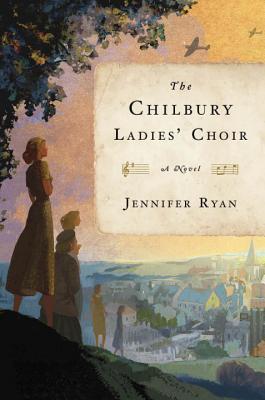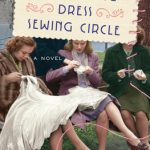 The Chilbury Ladies' Choir by Jennifer Ryan
The Chilbury Ladies' Choir by Jennifer Ryan Formats available: hardcover, paperback, ebook, audiobook
Pages: 384
Published by Crown Publishing Group on February 14th 2017
Purchasing Info: Author's Website, Publisher's Website, Amazon, Barnes & Noble, Kobo, Bookshop.org
Goodreads
"Just because the men have gone to war, why do we have to close the choir? And precisely when we need it most!"
As England enters World War II's dark early days, spirited music professor Primrose Trent, recently arrived to the village of Chilbury, emboldens the women of the town to defy the Vicar's stuffy edict to shutter the church's choir in the absence of men and instead 'carry on singing'. Resurrecting themselves as "The Chilbury Ladies' Choir", the women of this small village soon use their joint song to lift up themselves, and the community, as the war tears through their lives.
Told through letters and journals, The Chilbury Ladies' Choir moves seamlessly from budding romances to village intrigues to heartbreaking matters of life and death. As we come to know the struggles of the charismatic members of this unforgettable outfit -- a timid widow worried over her son at the front; the town beauty drawn to a rakish artist; her younger sister nursing an impossible crush and dabbling in politics she doesn't understand; a young Jewish refugee hiding secrets about her family, and a conniving midwife plotting to outrun her seedy past -- we come to see how the strength each finds in the choir's collective voice reverberates in her individual life.
In turns funny, charming and heart-wrenching, this lovingly executed ensemble novel will charm and inspire, illuminating the true spirit of the women on the home front, in a village of indomitable spirit, at the dawn of a most terrible conflict.
My Review:
The Chilbury Ladies Choir is the lovely and immersive story of a small coastal village in England during the early years of World War II. The story is told entirely through the letters and diaries of the members of the choir as they navigate the changes that have arrived in their little town in the wake of war.
The first change is the one that gives the choir both its name and its purpose. Chilbury is a small town. All the young men and even middle-aged men are gone. Only the very old and the very young are left. The local vicar, on that side of very old, comes to the traditional conclusion that without any men, without any tenors, baritones and basses, the church choir will have to disband for the duration.
The new music teacher disagrees. There is no reason why the women can’t make a choir of their own, with music altered to fit their soaring soprano and alto voices. And so it begins.
The ladies of the choir, at first hesitant to do something so completely nontraditional, discover that their voices have not been stilled. If anything, their voices have been amplified and expanded by the war, as they are left to take up all the tasks that are still required by village life, jobs that used to be filled by men.
As tradition falls by the wayside, so do many of the social restrictions that governed daily life, and more important for women before the war, the rigors of strict respectability. Things that were simply “not done” are now done all the time, whether that’s work at the nearby government installations or take up with a dodgy artist who claims to be too infirm to enlist.
Their world has been turned on its head, yet they soldier (and sing) on, even as they receive black-bordered telegraphs from the front and as bombs fall on their tiny town.
We view the early years of the war and the remaining denizens of the village through their eyes. Young Kitty Winthrop’s diary, and her older sister Venetia’s letters to a friend in London speak of the mundane and the tragic. We see their still simmering sibling rivalry, we experience almost-fourteen-year-old Kitty’s stops and starts at growing up. We experience the tragedy of Venetia’s love affair through her letters, and observe her through Kitty’s eyes as she changes from a self-absorbed vamp-wannabe to a grown woman who finally matures.
Through the letters of the local midwife and the diary of the local nurse, we see a great swindle unfold. And we see crime finally turned into triumph.
We see all the woman grow and change and expand into their new roles, into this frightening new world. And in the midst of so many tragedies, we see them rise along with their voices.
Escape Rating A: I think that a lot of readers are doing to compare The Chilbury Ladies Choir to The Guernsey Literary and Potato Peel Pie Society, and from the looks of things there certainly are similarities. Enough so that I feel the need to get a copy of Guernsey, which I haven’t read. Yet.
One big difference is that Guernsey takes place after the war, so the characters are reflecting on what happened rather than experiencing it fresh. Chilbury is contemporaneous, we read the letters and diaries as they are being written. We find ourselves in the middle of these characters lives, watching them change and grow. We learn about Kitty and Venetia’s family life by what they write, not by an omniscient narrator telling us that their father the local squire is a bully and a brute who abuses them and their mother. They write about what they feel as it happens, and we watch them try to avoid and justify and self-efface and cower in an attempt to survive. We feel their confusion and triumph as he finally gets put in his place.
We see half the women in the village experience some variation of his bullying and brutality, and cheer when someone finds a way to stand up to him and make it stick.
This is kind of a gentle story, in spite of the war. Some of the women experience tragedy, but because of the epistolary nature of the story, the blood and guts are not described, not even when the village is bombed. But the emotional tsunami in the aftermath is experienced again and again.
In a way, not a lot happens. And yet so much does. The story, much like the choir, works together so well that it is a joy to experience these women’s lives with them, even though we don’t know how it ends. And we don’t need to. The war eventually ended, but these women’s lives, and the lives they touched, went on. While it would be marvelous to see each one’s happy-ever-after (or at least get some resolution if they don’t get one) it doesn’t feel necessary for the story to conclude.
One final note: there is another author named Jennifer Ryan. The other Jennifer Ryan writes contemporary romance and romantic suspense. And was the source of one of my most sarcastic, and most liked, reviews on Goodreads, The Right Bride. The two Jennifer Ryans are definitely not the same.
If you love stories about the homefront during World War II, or women’s fiction, or just want to read a lovely story, I can’t recommend The Chilbury Ladies Choir highly enough.




















You definitely need to read the Guernsey Potato Peel book. For sure will check this out. 🙂
This sounds like a book I would very much enjoy. And I also think it would make a great movie!
Thanks for being a part of the tour.